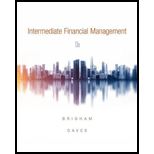
Intermediate Financial Management (MindTap Course List)
13th Edition
ISBN: 9781337395083
Author: Eugene F. Brigham, Phillip R. Daves
Publisher: Cengage Learning
expand_more
expand_more
format_list_bulleted
Question
Chapter 18, Problem 2Q
Summary Introduction
To determine: The reason why might such a firm decide to go public.
Expert Solution & Answer
Want to see the full answer?
Check out a sample textbook solution
Students have asked these similar questions
Article: The Dallas-Fort Worth area of Texas (DFW) experienced significant growth inpopulation over the past four years and its population is expected to continue to grow rapidlyover the coming years. Hospital administrative leaders at a large hospital in the DFW havenoticed a decrease in net profits, although there has been significant growth in the area. Leadersat the hospital surmised that they have not been able to meet the new demand because of aninsufficient number of employees and inadequate facilities. Additionally, the employee retentionrate decreased because of overworked employees due to the increased demand for services.Patient expectations are not being met causing unfavorable reviews. Hospital administrativeleaders are unsure of how to address the problem successfully.
What is the current problem on the above article and how the problem start?
Could you please help to explain what is the background of the problem to define and the root problem and explain the…
Please help with these questions.
Please help with this question 4-11
Chapter 18 Solutions
Intermediate Financial Management (MindTap Course List)
Knowledge Booster
Similar questions
- Please help with problem 4-6arrow_forwardYour father is 50 years old and will retire in 10 years. He expects to live for 25 years after he retires, until he is 85. He wants a fixed retirement income that has the same purchasing power at the time he retires as $45,000 has today. (The real value of his retirement income will decline annually after he retires.) His retirement income will begin the day he retires, 10 years from today, at which time he will receive 24 additional annual payments. Annual inflation is expected to be 5%. He currently has $180,000 saved, and he expects to earn 8% annually on his savings. The data has been collected in the Microsoft Excel Online file below. Open the spreadsheet and perform the required analysis to answer the question below. Required annuity payments Retirement income today $45,000 Years to retirement 10 Years of retirement 25 Inflation rate 5.00% Savings $180,000 Rate of return 8.00%arrow_forwardA textile company produces shirts and pants. Each shirt requires three square yards of cloth, and each pair of pants requires two square yards of cloth. During the next two months the following demands for shirts and pants must be met (on time): month 1, 2,000 shirts and 1,500 pairs of pants; month 2, 1,200 shirts and 1,400 pairs of pants. During each month the following resources are available: month 1, 9,000 square yards of cloth; month 2, 6,000 square yards of cloth. In addition, cloth that is available during month 1 and is not used can be used during month 2. During each month it costs $10 to produce an article of clothing with regular time labor and $16 with overtime labor. During each month a total of at most 2,000 articles of clothing can be produced with regular time labor, and an unlimited number of articles of clothing can be produced with overtime labor. At the end of each month, a holding cost of $1 per article of clothing is incurred (There is no holding cost for cloth.)…arrow_forward
- What is the general problem statement of the leaders lack an understanding and how to address job demands, resulting in an increase in voluntary termination? Refer to the article of Bank leaders discovered from customer surveys that customers are closing accounts because their rates are not competitive with area credit unions. Job demands such as a heavy workload interfered with employee performance, leading to decreased job performance.arrow_forwardDon't used hand raitingarrow_forward1 2 Fast Clipboard F17 DITECTIONS. BIU- Font B X C A. fx =C17+D17-E17 E F Merge & Center - 4 $ - % 9 4.0.00 Conditional Format as .00 9.0 Alignment Number Cell Formatting - Table - Table Styles - Styles Insert Delete Fe Cells H Mario Armando Perez is the kitchen manager at the Asahi Sushi House. Mario's restaurant offers five popular types of sushi roll. Mario keeps 4 careful records of the number of each roll type sold, from which he computes each item's popularity index. For March 1, Mario estimates 150 5 guests will be served. 6 8 9 10 11 04 At the end of the day, Mario also records his actual number sold in order to calculate his carryover amount for the next day. 7 Based on his experience, and to ensure he does not run out of any item, Mario would like to have extra servings (planned overage) of selected menu items available for sale. Using planned overage, the popularity index of his menu items, and his prior day's carryover information, help Mario determine the amount of new…arrow_forward
arrow_back_ios
SEE MORE QUESTIONS
arrow_forward_ios
Recommended textbooks for you
 Intermediate Financial Management (MindTap Course...FinanceISBN:9781337395083Author:Eugene F. Brigham, Phillip R. DavesPublisher:Cengage Learning
Intermediate Financial Management (MindTap Course...FinanceISBN:9781337395083Author:Eugene F. Brigham, Phillip R. DavesPublisher:Cengage Learning

Intermediate Financial Management (MindTap Course...
Finance
ISBN:9781337395083
Author:Eugene F. Brigham, Phillip R. Daves
Publisher:Cengage Learning


